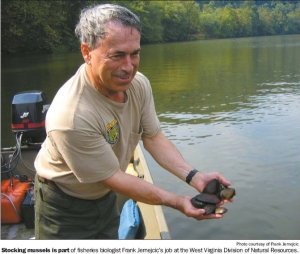
Morgantown Dominion
Post
24 September 2006
By William Jarrett
"Fisheries biologist." The job title may not be familiar to many. But, for Frank Jernejcic, it has been his career and passion.

Jernejcic moved from Ohio to West Virginia after high school to major in wildlife at WVU. He said he was always interested in wildlife and science, and WVU gave him the opportunity to do both with fisheries biology.
"The job consists of knowing subjects like basic biology, chemistry, statistics and physics. Along with having good public speaking and writing skills," Jernejcic said.
During his college years at WVU, he made friends with Dr. Dave Samuel who was also at the university working on his wildlife career.
Samuel said Jernejcic was always a hardworking individual during his college years and, even today, with his job at the West Virginia Division of Natural Resources.
After receiving his bachelor degree from WVU in 1967, Jernejcic headed to Iowa State University to get a master's degree in fisheries biology.
Jernejcic said that after graduate school, he decided to head back to West Virginia, where there was a job opening for a fisheries biologist at the WVDNR. Curtis Taylor, chief of wildlife and fishery, said he remembered when Jernejcic first came to the WVDNR.
"Jernejcic came here with a passion for his career and became a driving force in his work on fishery," Taylor said. "He commands respect and has a strong opinion on wildlife that can never be replaced when he ever decides to retire."
Jernejcic, 60, works on keeping the Cheat and Monongahela rivers clean from mine draining and populated with fish, along with other wildlife. Jernejcic also keeps busy with his favorite hobby: reptiles. He keeps a couple snakes in a tank in his office.
Jernejcic said he is often asked about snake problems and snakebites. He has even given a lecture on the subject to 100,000 people at one time.
"I have raised snakes for 40 years so I became something of an expert on snakes, which a lot of people come to me in asking questions and concerns about," Jernejcic said.
Not only does Jernejcic work as a fisheries biologist, but he also enjoys fishing, which he does about 40 to 50 days a year.
Jernejcic said his job takes up about a third of his life, but he wouldn't want it any other way, as he is always on the move doing something different, including tagging fish, improving sport fishing around the area, upkeeping the boats used by fishery staff and doing fish sampling at night.
The fish sampling, however, has to work on their schedule and life cycle, which can sometimes be challenging.
"The staff here is small, so we are involved in a lot of things like fish sampling, so we can't just skip on working on something important like that," Jernejcic said.
Recently, the fisheries staff has been working on two things: the monitoring of water quality and fish population, and the fish movement and the distribution impact on the rocks and damns around the Monongahela River.
Jernejcic said his career not only affects local areas and rivers, but he does work in the northern and southern areas of West Virginia.
"This work spreads out nationally and my job has been making such a difference - locally and nationally. And that's what drives me to do this," Jernejcic said.